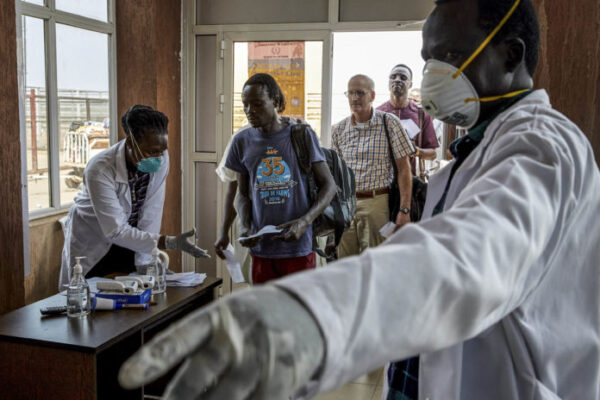PBS: Escaping Eritrea … [Read More...] about ካብ ውሽጢ ቤት ማእሰርታት ኤርትራ
In the face of the pandemic, human rights are a necessity — not a luxury
Solomon Dersso |3 Apr 2020 | Mail & Guardian

The Covid-19 pandemic, is of course, a public health emergency. But it is also a human and peoples’ rights issue.
Given the well-established principle of human rights law — that the state bears primary responsibility for protecting its people from threats to their rights to health and life — the first point of the the African Union’s African Commission on Human and Peoples’ Rights is that a state is to be held accountable when its failure or delay to initiate and implement appropriate measures leads to the spread of Covid-19, resulting in people falling seriously ill and losing their lives.
Equally important is the second point in the commission’s February 28 statement — that the obligation to respond to the threat through the measures recommended by public health experts for containing the spread of Covid-19 does not give them the licence to impose a wholesale limitation of other human rights. Such would be a case of making the cure worse than the disease itself.
But both the adequacy of the response to contain Covid-19 and the consistency of the response with the requirements of human and peoples’ rights are the function of how African states are led and how their governance system is organised to cater for the interests of the public.
So far, several countries including South Africa and Rwanda have mobilised responses that are on par with global recommended practices, but in other cases responses have not only been slow but also lacking in clarity, decisiveness and coherence. In Ethiopia, for example, after the announcement by government of the measures for prevention and containment of Covid-19 (by closing schools, limiting public gatherings, calling for hand washing and physical distancing), the newly minted ruling Prosperity Party has been convening large political meetings in various parts of the country — not only contradicting its own measures, but also signalling to the public not to take them seriously.
In other cases, although schools have been closed, religious gatherings have been allowed to continue. They also lacked a coherent communication strategy, opening avenues to the spread of all kinds of damaging misinformation. Also missing in some is clarity on the legal basis on which new restrictions of fundamental rights are founded.
Reflecting leadership and major governance gaps, a number of AU member states’ responses disproportionately affect the socioeconomic wellbeing of the most vulnerable people. The responses have also created conditions for the perpetration of violence, including killings and inhuman treatment by security forces as well as acts of bigotry and attacks against people from other countries by members of society.
Covid-19 is throwing into sharp relief the policy choices made, the quality of leadership and governance system of states when it comes to their healthcare systems. There is no doubt that the cost of Covid-19 will be particularly heavy in states with weak healthcare systems, poor socioeconomic conditions and fragile governance.
This is a risk for too many countries on the African continent. This is thanks in part to historical factors — such as colonialism, the International Monetary Fund’s structural adjustment programmes and apartheid — but is also a result of a failure of leadership and governance manifesting in negligent treatment accorded to health care and little investment in related services including water, sanitation and education.
It has taken the Covid-19 pandemic for Africa and much of the developed world to recognise the right to access to health care for all, this recognition has come too late. The world, and particularly countries with poor health systems and provisions of related services, will pay the price of this failure in deaths and dire socioeconomic consequences.
In this interconnected world, the consequences will be felt well beyond this continent’s borders. As Ethiopia’s Prime Minister Abiy Ahmed said in a Financial Times op-ed: “If Covid-19 is not beaten in Africa, it will return to haunt us all.”
The logic here is simple. As United Nations Secretary General Antonio Guterres put it: “We are only as strong as the weakest health system.” In the same way it spread from China to other parts of the world, there would be nothing that would stop the virus from spreading again from here.
If we learn one thing from this pandemic, it is that citizens require their states to be capable, responsive and respectful of human rights. Quality leadership and good governance is not a luxury, it is a human rights necessity.
Solomon Ayele Dersso chairs the African Commission on Human and Peoples’ Rights. He is also the founding director of Amani Africa, an Addis Ababa-based continental policy research think tank.
